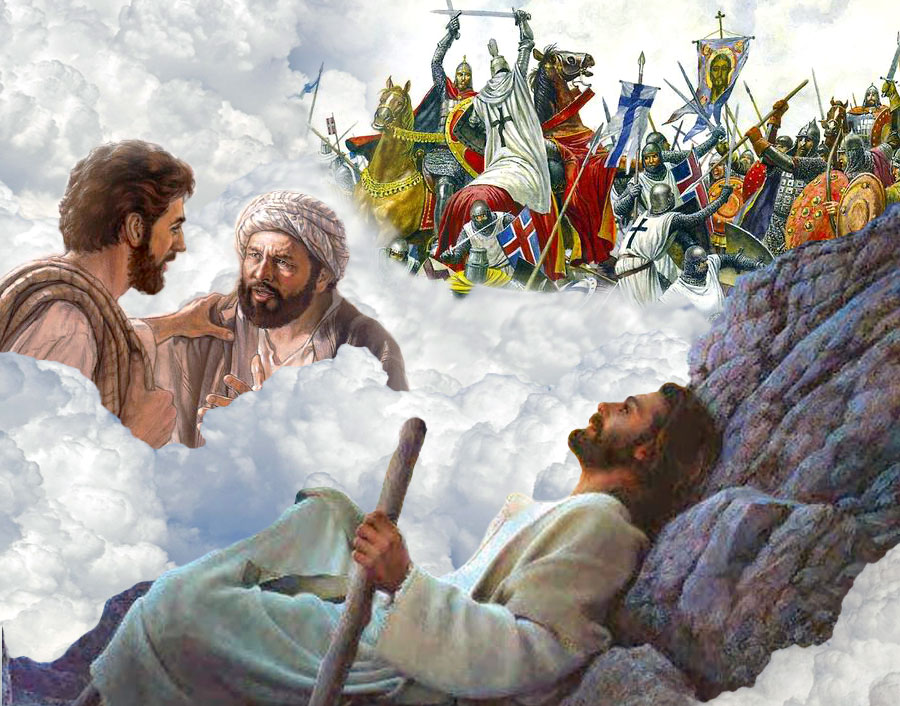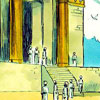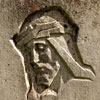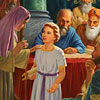The Prophetic Dream Of Jesus
 by Alexander Smyth
by Alexander Smyth
High up among the Judean mountains, on one of the most eastern ranges, not far from the city of Jericho, situated midway between the mountain top and the ravine’s deep abyss, there was a plateau containing a small fertile spot, being an oasis in the desert of the mountains. Several springs gushed from the mountains’ sides, and spreading over the small plain and mingling with the debris, a scanty supply of mold was produced, from which grass, shrubs, trees and moss sprang up spontaneously. This fertile spot was a miniature forest of pine, cedar, tamarisk, oak and palm trees. Interspersed with grass plats and running water near the center of this small verdant locality was a habitation or grotto, the cylindrical wall being constructed of rocky fragments, and the roof of rushes in the form of a cone; in the front of which, near to the entrance and under the shade of a tamarisk tree, was a long rude bench which seemed to be used as a seat or lounge.
The sun had passed the meridian, diffusing with undiminished splendor its life-inspiring rays upon the scene around, causing the air to be dry and sultry. At such a time all animals withdraw to shade and repose to avoid exposure to the sun when in the zenith of its power.
With his head pillowed upon his mantle, under the shade of the tamarisk tree, Jesus reclined upon the bench in front of his grotto. From early watching and fatigue of deep reflection, his bodily senses became exhausted and slumber gradually stole upon him, until his senses were lost in oblivion, and he was unconscious to the scene around him. But from certain passing motions and alternate expressions of his features, it could be seen that the inward man or spirit was awake and active. Jesus was asleep and dreaming; and as the mysterious vision flitted before the mental eye, so strong were the sympathies of the soul with the senses of the body, that it would, unbidden, impress them upon the features of the corporeal man. Alternately his features expressed surprise, admiration, love, reverence, fear or horror, which according to the medium’s perception, shall here be portrayed:
In the panorama of his mental sphere, Jesus saw himself wandering alone in the wilderness of the barren mountains, seeming to be in a reflective mood upon the approaching time, when he designed declaring his intentions and doctrines to the people. Some time he had wandered over plain, hill and gorge, without heeding whither he went. At length looking around him he perceived the scene to be unknown to him, and knew not the way to return. Some time he stood perplexed and undecided whether to proceed or endeavor to retrace his steps. All was barren, desolate and dreary around him; no signs of life or indications to any route. Long ranges of barren hills and mountains stood before and behind him; deep ravines and unfathomable abysses impeded his progress, without a prospect of succor from any living beings. He gave himself up for lost. For a few minutes he remained still with great uneasiness of mind, when at length he thought he saw something approaching him. Nearer and nearer it came; at length a venerable old man of a stern aspect and clothed in a loose dress, burst upon his view and stood before him.
“My friend, I am lost,” said Jesus, addressing the old man in a courteous tone of voice, and with a salutation of the body.
“So I perceive,” replied the old man complacently. “As thou hast not wandered very far from thy abode, it is possible to regain it before the day expires; but if thou shouldst go much farther thou wilt be irretrievably lost. This scene is a type of thy mind. At present, thou art in doubt how to proceed; but if thou pursuest thy inclinations thou wilt be lost.”
“How!” exclaimed Jesus. “Dost thou pretend to know my mind?”
“I do not pretend,” replied the old man with a smile, “but I actually do know thy mind, and as a friend who admires thy virtuous inclinations, I come forward to give thee warning so as to arrest thee from destruction. In the same manner I am capable of directing thy safe return to thy abode.”
“Thou fillest me with amazement,” cried Jesus, looking upon the old man with intense interest. “Give me proof that what thou sayest is true before I talk with thee any farther.”
“I can easily do that,” replied the old man, as he gave a peculiar disagreeable leer at Jesus, who felt an indefinable shudder pass through him at the time. “It is thy resolve before many hours shall have passed to start upon the world with the laudable intent of reforming mankind. Is it not so?”
Jesus gave an involuntary start and retreated a pace from the old man, regarding him with fearful amazement.
“Tell me,” he cried in a hurried and excited manner, “tell me who thou art, for I believe thou art something more than mortal.”
“I am,” replied the old man seriously; “yet all my sayings and doings are connected with mortals. I have lived from the first. I live with the present, and I shall live forever as long as man liveth, for I am the Recording Genius of Humanity. I trace the progress and aberrations of nations, and record them in a book which I call Experience. I note the gradual progress of mankind from barbarism to refinement, and sometimes from refinement to barbarism; and I can assure thee that when I reflect upon the various acts of man that I have recorded, many exceedingly wise axioms are brought to my view. Now, as I admire thy noble intentions of doing good to thy fellow men, I wish to give thee the benefit of my experience and reflections, which I will do in a few words. Forbear to put into execution thy designs, but return to thy simple and virtuous private life, and study to make thyself happy.”
“I cannot conceive,” replied Jesus rather indignantly, “that it is a man’s duty to live for himself alone. A man is but a small part of mankind, yet there is a mutual dependence and connection upon each other, either for good or evil. As one drop of water in the ocean is connected and dependent upon the whole mass, so is the mass affected by the single drop, either for good or evil. How, then, if a man be honest, virtuous, intelligent and full of love, can he do no good for his fellow men by teaching his principles and giving them his good examples?”
“All thy ideas are very good, according to their intrinsic worth,” replied the old man. “They may do good between one individual and another, but when thou talkest of applying it to a nation of people, that is quite another thing. The great difficulty will be to execute them, which thou wilt never be able to do. There never was a nation of people governed by preaching to them honesty, virtue, intelligence and love. There is not one now that acknowledges these principles as the rule of their government; and I may venture to say that it will be many, many centuries before there ever will be.”
“If such be the failings of our rulers,” remarked Jesus, “is it not possible to establish a virtuous power among the people by instructing them and setting examples?”
“That would be still more difficult and impossible,” returned the genius. “An individual it is possible to reform and bring to a certain degree of refinement, but not so a people. In the first place, when thou goest to preach thy doctrines to the people thou must be assured that their minds are prepared to receive them. They ought to have a sufficient mental capacity to comprehend any abstract or obscure point thou mayest bring before them, for unless they have such, thou mayest as well preach to a flock of goats or sheep. In the second place, some portion of the people may be able to conceive thy doctrines in part, and misunderstand a part; then there will be misunderstandings and misconstructions, giving a general confusion of errors. Another portion of the people may understand thee well, but their habits, vices and petty interests will prevent them from following thy instructions; and lastly another portion of the people may understand thee thoroughly, but their opposing interests will generate hate against thee. They accordingly will misrepresent and vilify thy doctrines and instructions, and then proceed to persecute thee, resting not until they procure thy destruction. Such has been the fate of nearly all those who have endeavored to enlighten the people; and such will ultimately be thine, if thou wilt persist in following their footsteps in neglecting the warning I give thee.”
“Great God!” exclaimed Jesus in a commiserative tone of voice, “if such be the fate of those who endeavor to improve mankind, how will the world ever be made virtuous and happy?”
“The Great God of Nature made man,” replied the genius impressively. “If he should think that mankind needs improving, he, no doubt, will do it himself, or cause his work gradually to improve itself. It certainly looks presumptuous for a man to think himself capable of improving what God has made before he understands his own nature or the nature and design of mankind whom he wishes to improve. Leave God’s work to God, and let every man who thinks himself superior to his fellow mortals, endeavor to improve himself. The Great God of Nature works by efficient means to accomplish his own ends, and no doubt mankind after passing through a succession of self-exalted grades, will ultimately arrive at that state to which he is destined.”
“Then thou thinkest that an appeal to man’s sense of reason and virtue will be of no effect in producing an amelioration in his condition?” observed Jesus inquiringly.
“Certainly not,” replied the genius. “I know it would be quite futile. There is no such thing as a general perception of reason and virtue among a people; every one has his own perception of things that he thinks will suit himself, which he calls his reason and virtue, and which will be quite different to those of his next door neighbor. All others will be quite different, one to the other; so that there will be as many perceptions of reason and virtue as there are people. Now, as this is true, would it not be vain and futile for a man to preach virtue, religion, morals and metaphysics to a nation of people, thinking to arrive at a general result, when left to their free minds to decide? It would be worse than futile—it would be absurd. The only possible way for a man to enlighten and benefit a nation, is for him, first, to seize and concentrate all the power of that nation within himself, and then if he should be a wise and virtuous man, he can coerce his people to do what is good for themselves, but not otherwise.
“Did Moses liberate his brethren from Egyptian bondage by preaching virtue and reason to the Egyptians? No; it was by force of numbers and arms. Did he establish his ideal God—the Great Jehovah—among his people, by preaching refined and abstruse doctrines among them? No; it was by the terror he created among them with his artificial thunder and lightning, the blowing of a brass trumpet, and the slaughter of a few thousand of his brethren. As long as Moses and his successors possessed this power over the Children of Israel, so long were they a people corresponding in character to the stern, cruel, fanatical and indomitable spirits that ruled over them. Thus it has been with all nations; thus it is with the present, and possibly will be the same of the future. The mass of mankind cannot be governed by appealing to their moral sentiments; they have no capacity to perceive the fitness of things for the general good; they have no gratitude for benefits conferred upon them, nor a just sense of manly dignity to lift them above petty interests, vices, frauds, or vindictive passions. There is but one thing they all acknowledge and bow to—that is Force.”
“Thy views, as thou hast stated them,” observed Jesus, “may be the legitimate deductions of man’s past history, and the present may seem to confirm them; but tell me, is man to continue always in this state of vice, ignorance and misery? Is there to be no starting point from which a new era is to commence, in which he shall make efforts to advance and improve his condition? I am of the opinion that era has now dawned. Opportunities are now great when a leader endowed with fortitude and good principles will not labor in vain in revolutionizing and reforming his fellow men. I cannot conceive that it will be displeasing to the Ruler of the Universe that one man shall endeavor to improve his fellow men by giving them enlightenment concerning the true principles of a happy and just life. With this view, I consider it my duty to run all ventures in undertaking the task, and with God’s permission I will do it.”
“Mark my words,” said the genius in a stern tone of voice, though the glance he threw upon Jesus was one of commiseration, “from the admiration I conceived for thee and thy virtuous intentions, I wished to save thee from the fatal consequences of an error. I gave thee warning to desist; I gave thee my reasons, and cited instances from the past history of man to confirm them; but thou dost still persist in thy infatuation to rush to thy own destruction. One other trial will I make, and then I will leave thee to do thy will. Suppose thou enterest upon the course thou designest, and meet with success at first, which is probable, I will now portray a picture of the future, which shall be as true to probability as the calculation that tomorrow’s sun shall rise.
“Thou shalt teach the people thy principles, consisting of the purest morality, relating to their nature and duties in life. Thou shalt give them the most exalted conceptions of a Deity, and enlighten them concerning the laws of the Universe; teach them their duty one to another; obedience to their rulers, and inculcate within them a love for all mankind. By this course thou wilt make many converts; some will understand thee, and some will follow from example. Thou wilt become popular among the people, having power over their minds. Thus far thou wilt be successful, but mark well what will follow:
“The truth of thy doctrines and thy popularity among the people will make thee enemies; some, from envy of thy power over the minds of the people; some will consider their interests injured by thy doctrines and works; others, who are dependent upon the institutions of the day, will be afraid that thy enlightenment of the people will ruin them. Then they will all combine to persecute and destroy thee. Misrepresentations and vile accusations they will disseminate concerning thee; charges will be preferred against thee, and then thy doom will be condemnation, ruin, and perhaps destruction by thy enemies.”
Jesus shuddered.
“That,” continued the Genius, “will be the evil result to thyself only. Now see what will follow to mankind at large:
“Thy death will give a new impulse to the dissemination of thy doctrines, or those which will be passed under thy name. Thou wilt be considered a martyr, which will make new converts daily. Ambitious and interested men will rise among them as leaders and expounders of thy doctrines and intentions; some additions and some omissions will be made. Then some misconceptions and misconstructions will take place; then a few fables and a great many lies will be added, so that, at length, there will be scarcely a precept, a principle, or a fact of thy original doctrines that will be taught by thy successors; yet every teacher will utter his fables, his lies, his vulgarisms and misconceptions in thy name, and call it gospel. Every teacher will gather what few facts he can concerning thy history, and add to them what fiction and lies he thinks proper, so that in course of time there will be a thousand histories of thee consisting of the most absurd and monstrous fictions,–each one differing from the others, and scarcely an item of truth in the whole. As time passes on new converts will be made who will disperse themselves far and wide into many countries. New forms and additional doctrines will be added to thine until thy original principles will assume a dark, gloomy and absurd system of superstition, which will be called a religion. There will be a wild fascination in it, which will create a fanatical zeal in its followers. In the commencement the converts of this new religion as they spread themselves over the world, will encounter great persecution from the old established authorities of previous systems of superstition. Tens and hundreds of thousands will undergo martyrdom in thy name, thinking themselves happy to die possessing thy doctrines, when at the same time they will be entirely ignorant of thy principles.
“The time at length will come when thy followers will predominate in the land; then a grand system of priesthood will be established with a supreme head, who, possessed of political power, will arrogate to himself a spiritual one. He will assume to hold the keys of heaven, pointing out the way for others to go, forgiving sins, and damning all who do not follow his suggestions and commands. The rage of persecution will now be turned; thy followers will be the persecutors. In thy name will they condemn the innocent, the just, the philosopher, and exterminate them with the sword, the rack, the gibbet and fire, calling upon them to repent and confess that thou art the Holy One, for whom all these murderous acts are consummated. The time will come when schisms will arise on doctrinal points, when one part of a people will believe this, and another that; the people of one nation will prefer this doctrine, and the people of another nation will believe that doctrine; then hatred will arise among nations. They will go forth to battle, mutilate and destroy each other in thy name. Each party will put prayers to thee in the supernal world, calling upon thee for thy assistance to help them slaughter each other, and when one party shall gain an advantage in battle they will sing praises in honor of thee for the help thou hast given them in destroying their fellow men. Thus the world will be deluged with blood. Mankind instead of progressing will retrograde in their nature and become demons. The earth will become a slaughter house, all to the glory of thy name. The minds of men will be filled with gloom, fanatical zeal, and a base, absurd superstition. They will live in dread and die in terror. Arts, sciences, literature, and all refinements will be banished from society temporarily; for nothing good will be enabled to exist where man is so cursed by the horrid superstition which will be built upon thy original virtuous principles. Like a huge demon it will ride upon the neck of society, making all mankind wretched and the whole earth a hell. Thus, however noble and benevolent may be thy intent, thy doctrines and name will prove for many centuries the curse of mankind!”
* * * * * * * * * * * * * * * * * * * * * * * * * * * * * * * * *
With a piercing shriek Jesus awoke from his unquiet sleep. Terror was depicted upon his countenance, and he trembled in every nerve. The external scene of his abode and locality impressed his senses, when he found that all he thought he had just experienced was no more than a dream. Still the vision was fixed in his mind, and the voice of the Genius still rung in his ear: “The Curse of Mankind!” He shuddered at the awful thought.
Just at this point of time, John of Galilee, the young companion of Jesus, and Judas in company, were approaching the grotto, when perceiving Jesus they saw that he was in a troubled state. They immediately rushed towards him and seized him by the hands.
“Dearest brother,” cried John with much alarm expressed in his fair youthful countenance, “what aileth thee?”
“Dear master,” said Judas, as he endeavored to assume an expression of fearful solicitude, “tell thy devoted servant and follower what it is that disturbs thee.”
Jesus leaned upon John’s shoulder, and with his right hand covering his eyes, he remained silent for a time, endeavoring to recover his thoughts and composure, but at length he replied:
“My friends, pardon me for having given you any alarm. I have been sleeping, and have had a dream so replete with terrible images that it shook me to the soul; and since I have awakened I find my nerves sympathetically affected by the same; but all will be well in a little time.”
“Impart to us, dear brother, the nature of this dream,” said John in a soft child-like voice. “Perhaps we can give some interpretation of it, or at least give comfort by our counsel.”
“Let us be seated, then, and I will do so,” returned Jesus as he bent his steps to the grotto, followed by his attendants.
The interior of the grotto was a plain circular chamber, without any furniture excepting a part being elevated around the wall, which was covered with rushes and coarse cloth, serving as seats and couches.
The parties entering, seated themselves and reclined at their ease. Jesus, after receiving a refreshment of wine and water at the hands of Judas, commenced to relate his dreams; and as he proceeded in the narrative, the large blue eyes of John were expressive of wonderment, while Judas gave many demonstrations of being equally affected.
John of Galilee was a great believer in spirits visiting mankind to guard or interrupt them in their doings and intentions. Some of these spirits he believed to be of a friendly, and some of a malignant nature so whenever anything of an extraordinary nature occurred to men. John endeavored to account for it by his philosophy of spirits. Thus when Jesus had related his dream, John observed:
“My dear brother, there is no doubt that this dreadful dream has been produced by one of the evil spirits—perhaps the great Arch Fiend himself—for he is capable of assuming any character and speaking in any strain. He can pretend to be as pious as the High Priest, or he can speak with the wisdom of a philosopher. There is no doubt it was he who appeared to thee. He has been enabled to see the good thou art about to do for mankind, and as he wishes men to continue in their old ways of wickedness, he wishes to prevent thee in thy design of reforming them by impressing thee with the idea that evil will come of thy labors instead of good.”
John then appealed to Judas to know if he did not think that to be the true solution of the matter, when the latter, after a few moments reflection in which he found it would suit his purposes, gave John to understand that he was of the same opinion.
“It may be as thou sayest, John,” replied Jesus, “for I am not much acquainted with the nature of evil spirits; but I rather think that my dream proceeded from some doubts and conflicting ideas I had previous to my going to sleep.”
Some time afterwards that dream was given to the people by Judas in a modified state. He represented the Arch Fiend tempting Jesus in the wilderness, offering him all the world to forego his intentions.
There was some further conversation upon this subject, which at length was lost sight of by Jesus observing:
“My friends, it is my wish that we depart from this locality tomorrow. We will commence our travels, and wend our way to my native village in Galilee—to Nazareth where I will commence the great task I have imposed upon myself. May God give me strength to proceed, and success in my undertakings. John, thou must attend to my person and be the first officer between me and others. Judas shall carry the bag, and be our provider in all things necessary to us on our journey and when we sojourn. After a while, I will take to me more followers who shall aid me in my endeavors; for we know that the greater the number of workmen in the vineyard the greater will be the produce. Then let every thing be prepared, and by sunrise tomorrow we will bid adieu to this, our abode.”
Excerpt from The True Life of Jesus of Nazareth – Vision Nine
Posted in Book Excerpts, The True Life of Jesuswith comments disabled.





